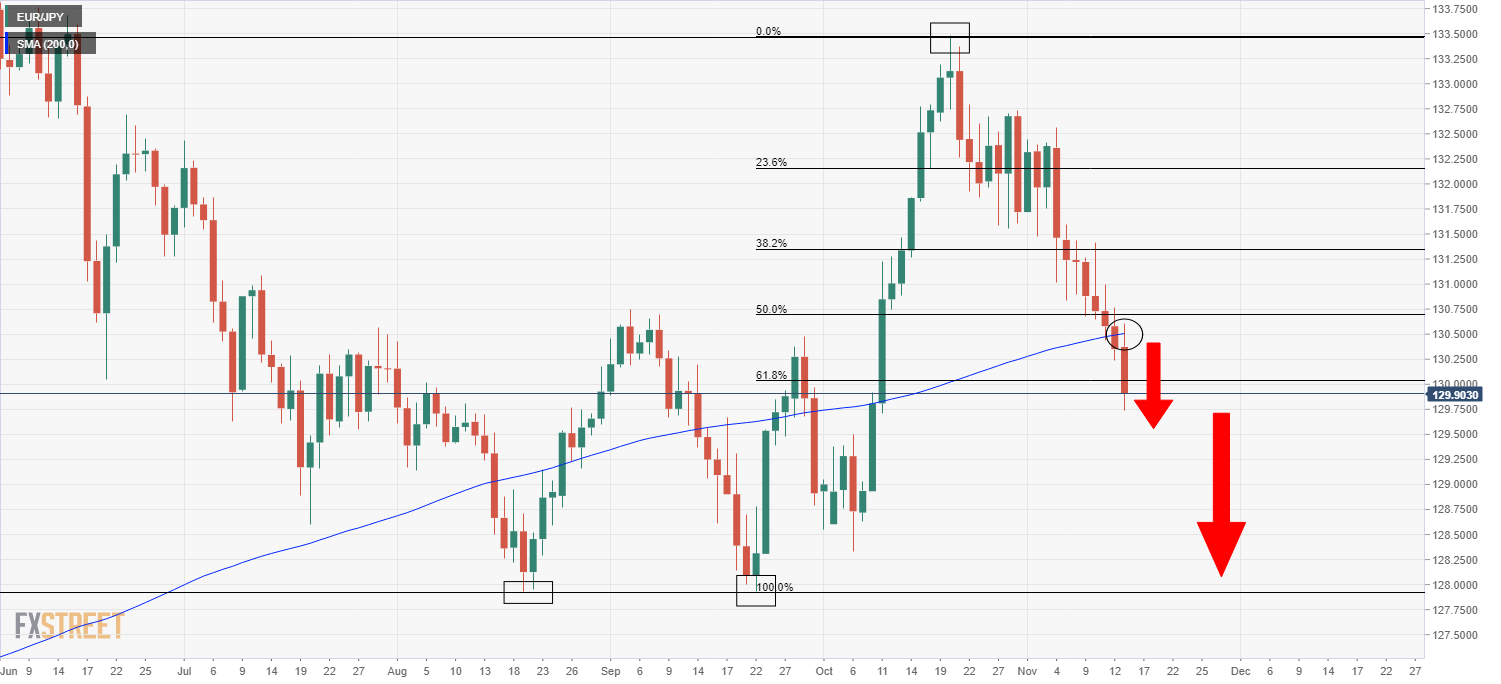- Analytics
- News and Tools
- Market News
- EUR/JPY slides below 130.00 amid broad euro underperformance, technicians eye push towards 128.00
EUR/JPY slides below 130.00 amid broad euro underperformance, technicians eye push towards 128.00
- EUR/JPY has slid under 130.00 and is set for a seventh negative session in the last eight.
- The euro saw broad underperformance on Monday amid dovish ECB vibes, concerns about the state of the EU’s Covid-19 outbreak.
Amid a bout of broad euro weakness, EUR/JPY has seen significant selling pressure on the first trading day of the week, falling from around the 130.40 area and close to its 200DMA to current levels under 130.00. The pair is set to end Monday’s session 0.3% lower, which would mark a fifth consecutive session in the red and seventh negative session in the last eight. Over this time period (the last eight sessions), the pair has dropped around 2.0% from above 132.50 to current levels under 130.00.
EUR/JPY has now convincingly lost grip of its 200DMAat 130.50 and also broke below a key Fibonacci retracement at just above 130.00 (the 61.8% retracement back from the October high at 13350 to the summer lows at 1.2800). Technically speaking then, recent losses have opened the door to an extension of downside towards those summer lows.

Euro underperformance
Market commentators cited dovish ECB speak and concerns about the worsening pandemic situation in the Eurozone as key drivers of Monday’s underperformance in the euro. In terms of the former, ECB officials, including President Christine Lagarde and Vice President de Guindoes, doubled down on the insistence that favourable financing conditions must be maintained in the Eurozone to support the economic recovery. ECB officials also continue to see inflationary pressures as transitory. Meanwhile, the Netherlands started a three-week lockdown at the weekend, Austria is imposing a lockdown on the unvaccinated and infection rates in Germany are at a record high.
Whilst these themes, which have been talking points for a while now, haven't necessarily been driving broad euro underperformance in recent sessions, they likely have been driving the euros underperformance versus the safe-haven yen. Some of the recent underperformance may also reflect some catch-up to a narrowing of Eurozone/Japan rate differentials. Between 1 – 5 November, German 10-year yields dropped nearly 20bps versus a mere 5bps drop in Japan 10-year yields, all while EUR/JPY barely moved.
Either way, as the economic outlook in the Eurozone darkens this winter due to the pandemic and the ECB continues to push back against any hint of early monetary tightening, the euro may well continue to underperform the yen. Monday’s Asia Pacific session saw the release of Japanese Q3 GDP data and whilst this did disappoint on expectations, this likely boosts the outlook for the Japanese economy in Q4 2021/Q1 2022 as it improves the momentum behind Japan PM Kishida’s stimulus plans.
© 2000-2026. All rights reserved.
This site is managed by Teletrade D.J. LLC 2351 LLC 2022 (Euro House, Richmond Hill Road, Kingstown, VC0100, St. Vincent and the Grenadines).
The information on this website is for informational purposes only and does not constitute any investment advice.
The company does not serve or provide services to customers who are residents of the US, Canada, Iran, The Democratic People's Republic of Korea, Yemen and FATF blacklisted countries.
Making transactions on financial markets with marginal financial instruments opens up wide possibilities and allows investors who are willing to take risks to earn high profits, carrying a potentially high risk of losses at the same time. Therefore you should responsibly approach the issue of choosing the appropriate investment strategy, taking the available resources into account, before starting trading.
Use of the information: full or partial use of materials from this website must always be referenced to TeleTrade as the source of information. Use of the materials on the Internet must be accompanied by a hyperlink to teletrade.org. Automatic import of materials and information from this website is prohibited.
Please contact our PR department if you have any questions or need assistance at pr@teletrade.global.















